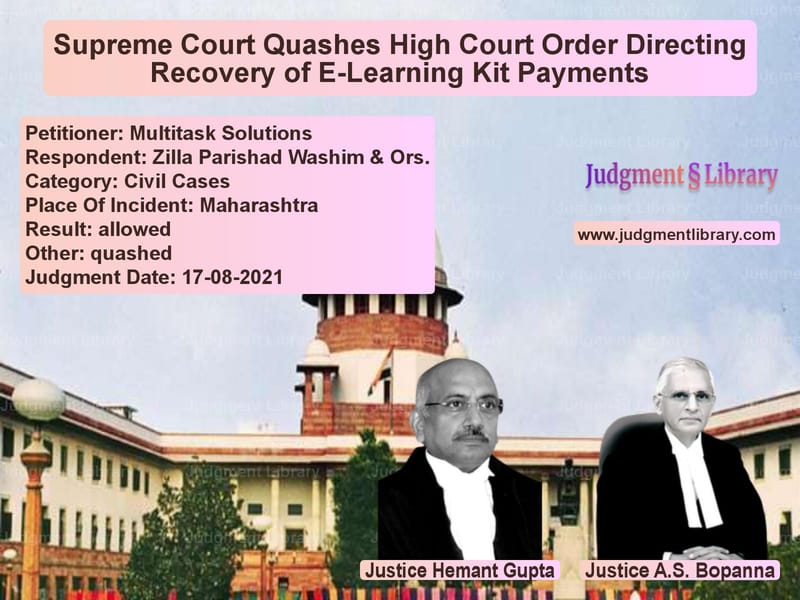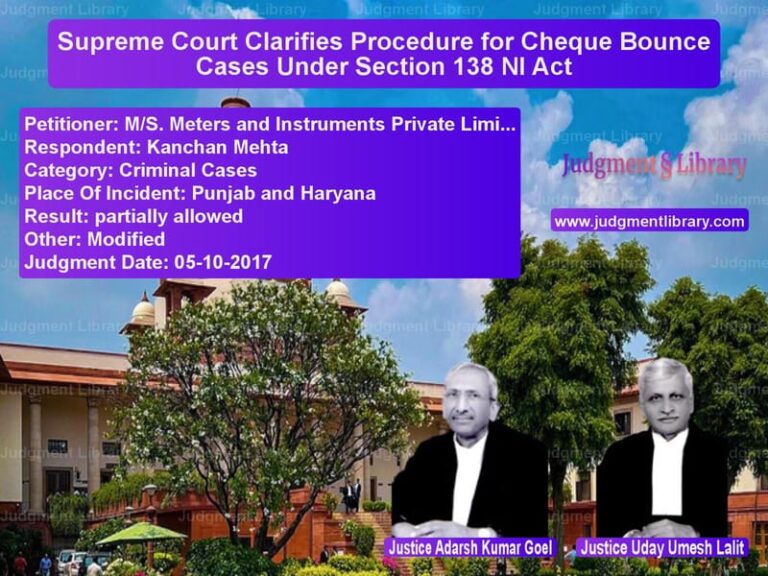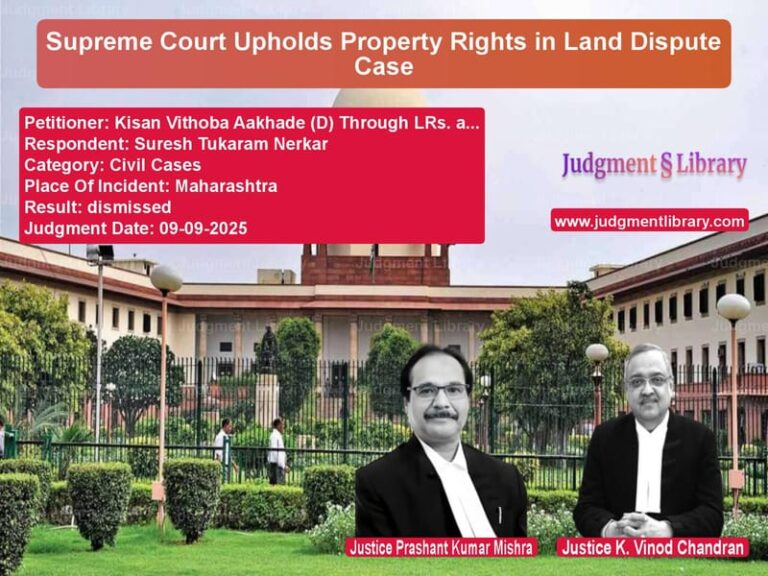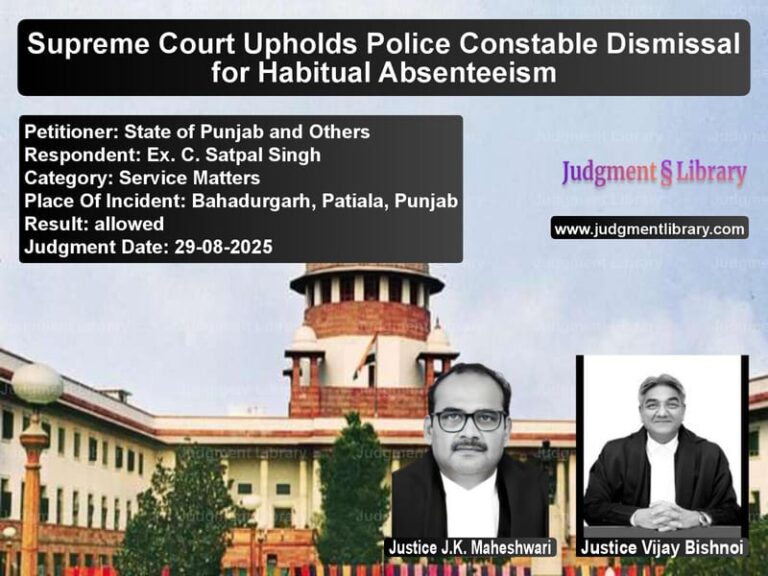Supreme Court Quashes High Court Order Directing Recovery of E-Learning Kit Payments
The case of Multitask Solutions v. Zilla Parishad Washim & Ors. involves the Supreme Court’s decision to set aside an order by the Bombay High Court that directed the recovery of payments made to the appellant for the supply of e-learning kits. The Court held that the High Court had acted without proper reference to the contractual obligations and did not provide the appellant an opportunity to present its case.
Background of the Case
The Zilla Parishad, Washim, issued an e-tender for the purchase of e-learning kits under the Sarva Shiksha Abhiyan scheme. The tender was published on 13 June 2014, and the opening of the financial bid took place on 19 August 2014. The appellant, Multitask Solutions, was the lowest bidder and was awarded the contract to supply the kits.
A rival bidder, Kasturi Suppliers, was disqualified in the technical evaluation and challenged the tender process before the Bombay High Court. Though the High Court initially dismissed the rival bidder’s challenge, it later converted the case into a public interest litigation (PIL) after finding discrepancies in pricing and procurement across different Zilla Parishads.
Key Issues Raised
- Whether the High Court was justified in converting a commercial dispute into a PIL and ordering the recovery of payments.
- Whether the High Court acted within its jurisdiction in directing criminal action against the appellant and Zilla Parishad officials.
- Whether the appellant was denied an opportunity to be heard before the High Court issued its order.
Petitioner’s Arguments
The appellant, Multitask Solutions, argued that:
- The High Court’s decision to order the recovery of payments was made without any inquiry or due process.
- The supply of e-learning kits had already been completed as per the contract terms, and no complaint had been raised regarding the quality of the kits.
- The High Court had ignored the government inquiry report, which did not find any wrongdoing by the appellant.
- The conversion of a commercial dispute into a PIL was improper and based on allegations made by a disqualified bidder.
Respondent’s Defense
The Zilla Parishad Washim and the State of Maharashtra defended the High Court’s order, arguing that:
- The procurement process lacked transparency and warranted further scrutiny.
- The price of the e-learning kits supplied by the appellant was significantly higher than similar kits supplied to other Zilla Parishads.
- The High Court’s order was intended to prevent financial irregularities in public procurement.
Supreme Court’s Ruling
The Supreme Court set aside the High Court’s order, ruling that:
- The High Court had exceeded its jurisdiction by ordering the recovery of payments without a proper inquiry.
- The appellant was not given an opportunity to present its defense before the order was passed.
- The procurement was conducted through a competitive bidding process, and there was no finding that the appellant had violated any contract terms.
Key Observations from the Judgment
The Supreme Court observed:
“The High Court acted beyond its jurisdiction by converting a commercial dispute into a public interest litigation without a proper basis.”
The Court further held:
“The appellant was denied an opportunity to be heard before adverse orders were passed. Due process requires that no adverse order be passed without affording a fair hearing to the affected party.”
Final Judgment
The Supreme Court ruled that:
- The High Court’s order directing the recovery of payments was quashed.
- The criminal proceedings initiated based on the High Court’s directions were also set aside.
- If the government wished to conduct an inquiry, it must follow due process and provide the appellant an opportunity to respond.
Impact of the Judgment
This ruling reaffirms the principle that courts must exercise restraint when dealing with contractual disputes and should not interfere in commercial transactions without proper inquiry. Key takeaways include:
- High Courts must not convert commercial disputes into PILs without sufficient justification.
- Due process and fair hearing are essential before ordering financial recoveries or initiating criminal proceedings.
- Public procurement disputes must be handled through established legal and administrative channels.
Conclusion
The Supreme Court’s decision in Multitask Solutions v. Zilla Parishad Washim & Ors. is a crucial precedent in ensuring that commercial disputes are not arbitrarily turned into PILs. The ruling emphasizes the need for procedural fairness in judicial proceedings and protects companies from unwarranted financial and legal repercussions.
Petitioner Name: Multitask Solutions.Respondent Name: Zilla Parishad Washim & Ors..Judgment By: Justice Hemant Gupta, Justice A.S. Bopanna.Place Of Incident: Maharashtra.Judgment Date: 17-08-2021.
Don’t miss out on the full details! Download the complete judgment in PDF format below and gain valuable insights instantly!
Download Judgment: multitask-solutions-vs-zilla-parishad-washi-supreme-court-of-india-judgment-dated-17-08-2021.pdf
Directly Download Judgment: Directly download this Judgment
See all petitions in Contract Disputes
See all petitions in Public Interest Litigation
See all petitions in Judgment by Hemant Gupta
See all petitions in Judgment by A. S. Bopanna
See all petitions in allowed
See all petitions in Quashed
See all petitions in supreme court of India judgments August 2021
See all petitions in 2021 judgments
See all posts in Civil Cases Category
See all allowed petitions in Civil Cases Category
See all Dismissed petitions in Civil Cases Category
See all partially allowed petitions in Civil Cases Category







